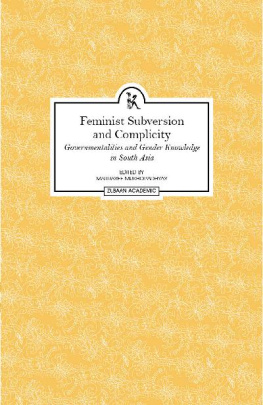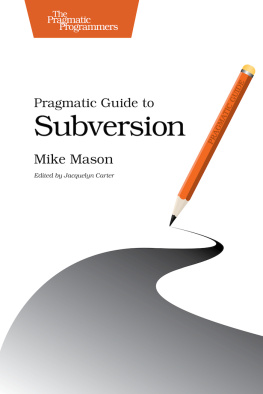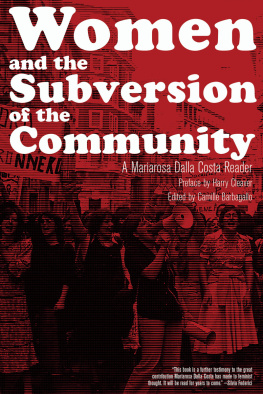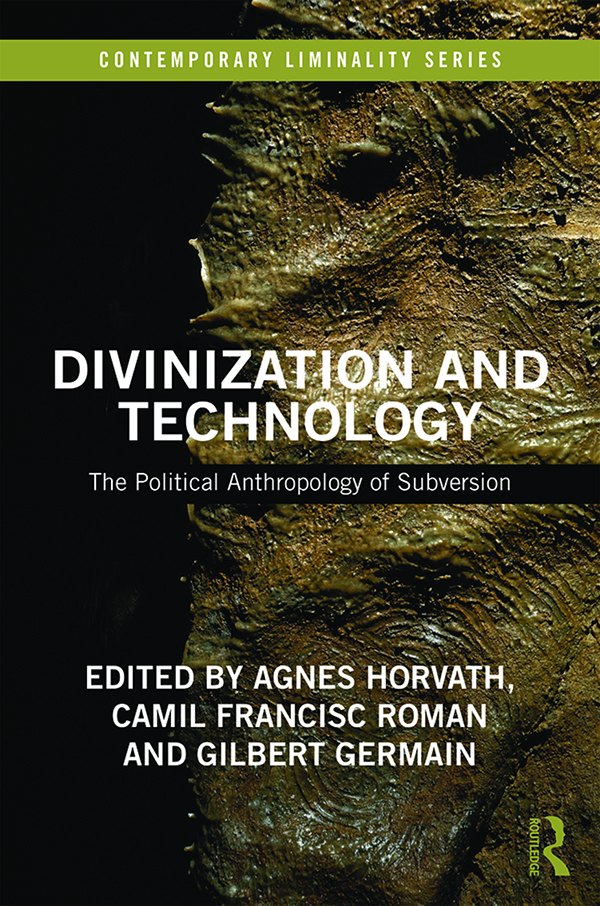Contents
Divinization and Technology
This book offers a political anthropological discussion of subversion, exploring its imbrication with technological and divinization practices, and uncovering some of its particular effects on human existence, from prehistory to the contemporary age. Subversion is often romanticized as a means of opposing or undermining power in the name of supposedly universal values, yet techniques of subversion are actually deployed by people of all modern political and philosophical persuasions. With subversion having become a tool of mainstream power that threatens to dominate social and political reality, and so render the populace servile and subject to a generalized culture industry, Divinization and Technology examines the ways in which technology and divinization, with their efforts to unite with divine powers, can be brought together as modalities of subversion.
Agnes Horvath is a founding and chief editor of International Political Anthropology. She taught in Hungary, Ireland and Italy, and was affiliate visiting scholar and supervisor at Cambridge University. She is the co-author of Walking into the Void: A Historical Sociology and Political Anthropology of Walking, the co-editor of Breaking Boundaries: Varieties of Liminality, and the author of Modernism and Charisma.
Camil Francisc Roman is Lecturer in Political Science at the John Cabot University, Roma Tre University and LUMSA University (Libera Universit Maria Ss. Assunta), Rome. He is also an acting editor of International Political Anthropology. He has published various chapters and papers, and is currently finishing a research monograph for Routledge entitled The French Revolution as a Liminal Process: Understanding the Political Schismogenesis of Modernity (forthcoming 2019).
Gilbert Germain is Professor of Political Thought at the University of Prince Edward Island, Canada. He is the author of several books, including Thinking about Technology: How the Technological Mind Misreads Reality and Spirits in the Material World: The Challenge of Technology.
Divinization and Technology
The Political Anthropology of Subversion
Edited by Agnes Horvath,
Camil Francisc Roman and
Gilbert Germain

First published 2019
by Routledge
2 Park Square, Milton Park, Abingdon, Oxon OX14 4RN
and by Routledge
52 Vanderbilt Avenue, New York, NY 10017
Routledge is an imprint of the Taylor & Francis Group, an informa business
2019 selection and editorial matter, Agnes Horvath, Camil Francisc Roman and Gilbert Germain; individual chapters, the contributors
The right of Agnes Horvath, Camil Francisc Roman and Gilbert Germain to be identified as the authors of the editorial material, and of the authors for their individual chapters, has been asserted in accordance with sections 77 and 78 of the Copyright, Designs and Patents Act 1988.
All rights reserved. No part of this book may be reprinted or reproduced or utilised in any form or by any electronic, mechanical, or other means, now known or hereafter invented, including photocopying and recording, or in any information storage or retrieval system, without permission in writing from the publishers.
Trademark notice: Product or corporate names may be trademarks or registered trademarks, and are used only for identification and explanation without intent to infringe.
British Library Cataloguing-in-Publication Data
A catalogue record for this book is available from the British Library
Library of Congress Cataloging-in-Publication Data
A catalog record has been requested for this book
ISBN: 978-0-815-35988-3 (hbk)
ISBN: 978-1-351-11962-7 (ebk)
Typeset in Times New Roman
by codeMantra
Contents
AGNES HORVATH, CAMIL FRANCISC ROMAN AND GILBERT GERMAIN
AGNES HORVATH, CAMIL FRANCISC ROMAN AND GILBERT GERMAIN
AGNES HORVATH
GILBERT GERMAIN
CAMIL FRANCISC ROMAN
FEDERICA MONTAGNI
TOM BOLAND
HARALD WYDRA
JOHN OBRIEN
PAUL TYSON
ARPAD SZAKOLCZAI
AGNES HORVATH, CAMIL FRANCISC ROMAN AND GILBERT GERMAIN
Contemporary Liminality
Series editors:
Arpad Szakolczai, University College Cork, Ireland
Series advisory board:
Agnes Horvath, University College Cork, Ireland
Bjrn Thomassen, Roskilde University, Denmark
Harald Wydra, University of Cambridge, UK
This series constitutes a forum for works that make use of concepts such as imitation, trickster or schismogenesis, but which chiefly deploy the notion of liminality, as the basis of a new, anthropologically-focused paradigm in social theory. With its versatility and range of possible uses rivalling and even going beyond mainstream concepts such as system structure or institution, liminality is increasingly considered a new master concept that promises to spark a renewal in social thought.
In spite of the fact that charges of Eurocentrism or even moderno-centrism are widely discussed in sociology and anthropology, it remains the case that most theoretical tools in the social sciences continue to rely on taken-for-granted approaches developed from within the modern Western intellectual tradition, whilst concepts developed on the basis of extensive anthropological evidence and which challenged commonplaces of modernist thinking, have been either marginalised and ignored, or trivialised. By challenging the assumed neo-Kantian and neo-Hegelian foundations of modern social theory, and by helping to shed new light on the fundamental ideas of major figures in social theory, such as Nietzsche, Dilthey, Weber, Elias, Voegelin, Foucault and Koselleck, whilst also establishing connections between the perspectives gained through modern social and cultural anthropology and the central concerns of classical philosophical anthropology Contemporary Liminality offers a new direction in social thought.
Titles in this series
7 Walling, Boundaries and Liminality
A Political Anthropology of Transformations
Edited by Agnes Horvath, Marius Ion Bena and Joan Davison
8 The Spectacle of Critique
From Philosophy to Cacophony
Tom Boland
9 Divinization and Technology
The Political Anthropology of Subversion
Edited by Agnes Horvath, Camil Francisc Roman and Gilbert Germain
For more information about this series, please visit: https://www.routledge.com/sociology/series/ASHSER1435
This volume connects three concepts which in the first instance appear to be unrelated or even contradictory as constitutive components of our modern existence: technology, divination and subversion. In fact, and as the authors show, technology has a lot to do with human attempts to attain divine power, which at the same time subvert existing order. Provocative, and with what is sure to be a profound impact, this book, with authors from multi-disciplinary backgrounds, forces sociologists, political scientists, philosophers, historians, and theologians alike to re-evaluate their pre-conceived ideas.
Ivan Szelenyi, William Graham Sumner Professor of Sociology and Political Sciences, Yale University, USA














